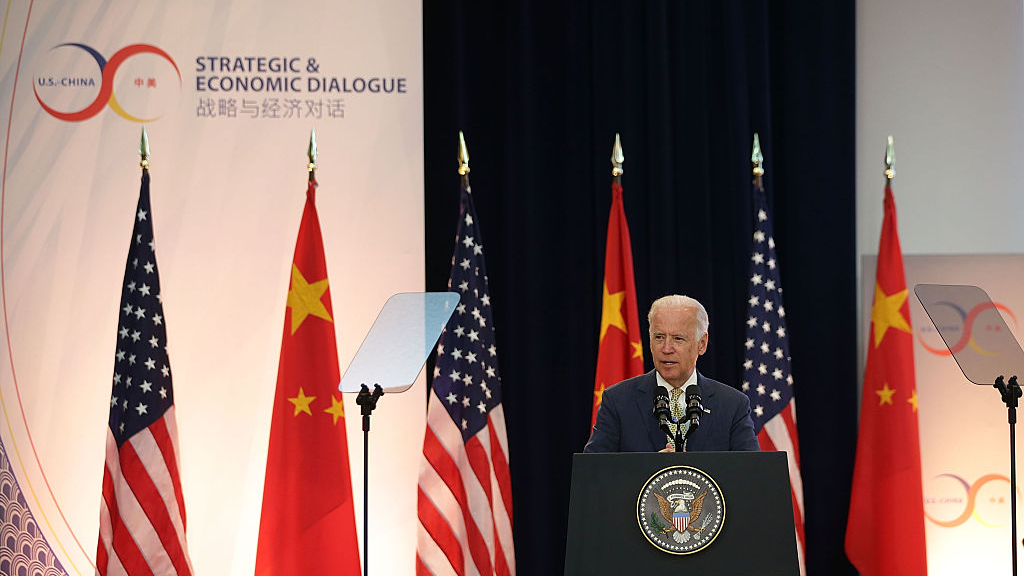
Customers watch a speech by Joe Biden on a television during an election watching event at a local bar in Beijing, China, November 4, 2020. /Getty
Customers watch a speech by Joe Biden on a television during an election watching event at a local bar in Beijing, China, November 4, 2020. /Getty
Editor's note: Alessandro Golombiewski Teixeira is a National Thousand Talent Distinguished Professor of Public Policy at the School of Public Policy and Management, Tsinghua University, and a professor of International Business at Schwarzman College in Tsinghua. He is a former special economic adviser to the president of Brazil and former minister of tourism, and minister of development, industry, and foreign trade of Brazil. He was also president of the World Investment Association – WAIPA. The article reflects the author's views, not necessarily those of CGTN.
Policymakers around the world are speculating as to what foreign policy under President-elect Joe Biden might look like. Facing another surge in virus cases this week, whoever wins the election will have a lot on their plate. Yet a failure for Donald Trump to win a second term could be a real turning point for the current U.S. foreign policy, in particular with regard to China.
Over the course of President Trump's administration, Trump has hit China with blow after blow, an approach to diplomacy described as "scorched earth" – taking disproportionately punitive measures in order to spite his enemies. By taking a sledgehammer to the U.S.-China relationship and imposing tariffs on $360 billion worth of Chinese goods, Trump has completely transformed the global landscape and pitted China's rise as a direct challenge to U.S. hegemony.
Joe Biden on the other hand was an advocate for Obama's "pivot" to Asia and places far greater emphasis on building alliances and appears far less keen on handing out tariffs. If Biden wins the election by the landslide that national poll predicts him to do, it is difficult to see how the U.S.-China relationship won't see a substantial change in the upcoming years.
The likely U.S.-China relationship is to develop in three main ways as follows:
Reduced threat of tariffs
Biden is expected to be "Trump-lite" on China – easing off on a few key issues but largely taking on the mantle from his predecessor. For the trade tensions, although Biden says he has no plans to remove existing tariffs, no new tariffs are expected. A Biden presidency is seen as being less antagonist, less likely to increase tariff-related risk, improving overall sentiment for global investors.
Biden criticized Trump's phase one trade deal with China, saying it is "unenforceable." He also declared tariffs as hurting American farmers and manufacturers, which could give Biden leverage in any dealings with China. However, this does not mean Biden is likely to be "soft on China," as Trump accuses. In September, Democrats announced a $350 billion plan to confront China.
Certainly, a U.S.-China rivalry of some degree looks here to stay. Recently, Biden has said that he considers Beijing to be Washington's biggest competitor. "I think the biggest competitor is China and the relations depend on how we deal with it will determine whether we are competitors or end up in a more serious competition of strength".
Improving communication and multilateral dialogue

Joe Biden delivers remarks during the joint opening session of the Strategic and Economic Dialogue (S&ED) and Consultation on People-to-People Exchange (CPE) at the State Department in Washington, D.C., U.S., June 23, 2015. /Getty
Joe Biden delivers remarks during the joint opening session of the Strategic and Economic Dialogue (S&ED) and Consultation on People-to-People Exchange (CPE) at the State Department in Washington, D.C., U.S., June 23, 2015. /Getty
In the event of a Biden win, one key issue that might undergo a change is Trump's "America First" policy. Biden is expected to revert to a more traditional American multilateral approach to foreign policy. By supplanting unilateralism with a worldview that understands the benefit of international cooperation, it would make sense for Biden to move to patch frayed alliances and mend U.S. prestige on the world stage.
As a result, Biden's presidency could help resume a degree of normalcy, competence, and predictability for U.S.-China relations, providing a foundation to address the countless problems facing the relationship.
It's not just China that is seeing their relations with the U.S. reach an all-time low. U.S.-EU relations are worsening, and African leaders are in dire need of international assistance in crises such as COVID-19. "Biden will have more platforms or channels to negotiate with China, and we may see a less intense world," said Wang Huiyao, a prominent think-tanker.
This, in itself, would be an enormously positive step in U.S.-China relations and help to overcome hysteria and ever-hardening rhetoric. Candid, clear discussion driven by complementary interests is necessary to halt the global pandemic.
An end to unease?
U.S.-China relations have deteriorated far from the point of closer ties to benefit economic cooperation. However, the incentive to heal trade relations and de-escalate the trade war continues to be in the background as neither country can afford to turn a blind eye to their economic interdependence.
Unfortunately, American voters' and lawmakers' view of China could limit Biden's choices when it comes to foreign policy with China, especially as Trump has set both Democrats and Republicans on a downward trajectory that poses few opportunities for someone like Biden to increase cooperation with China.
Unresolved issues over a failed phase one trade deal could pave the way for a re-evaluation of the current trade war and deals, to one that involves the World Trade Organization (WTO). This would replace Trump's current array of self-destructive policies that have also damaged the WTO's dispute resolution mechanism.
Ultimately, a Biden administration would have major implications for global cooperation and likely seek to restore the centrality of the U.S. in global affairs. If this is the case, the U.S.' isolationist and hyper-nationalist foreign policy will give way to new opportunities to engage around trade, global health, and climate change. Biden simply can't afford to leave China out of these discussions.
(If you want to contribute and have specific expertise, please contact us at opinions@cgtn.com.)